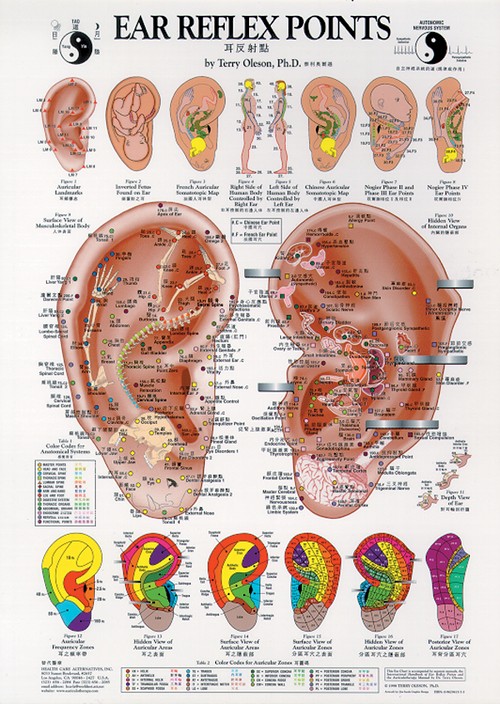SPOILER ALERT!
~ Auriculotherapy involves stimulating specific points in the ear with needles, electrical stimulation, probes or fingers
~ When the right point is stimulated, endorphins are released. They are the feel-good hormones.
~ Studies show that it helps reduce anxiety in certain cases
Auriculotherapy is a practice in traditional Chinese medicine that is a combination of reflexology and acupuncture. It is believed that the outer part of the ear consists of several points that are connected to other organs in the body.
An anatomical map of the body on the outer ear
By stimulating a specific point on the ear, some signal is sent to the brain and specific organ to elicit adjustment and balance of the physiological function. More specifically, the ear is thought to represent a map of the body in which each point is connected to another organ in the body, and thus stimulating one particular point further stimulates the corresponding organ.
Stimulation can be performed via needles, vaccaria seeds, probes and fingers, direct electrical stimulation of points on the ears, and/or laser. Once a point is stimulated, endorphins are released into the blood, which is believed to be instrumental in the anxiolytic (i.e., reduce anxiety) effects of this therapy.
Reducing stress and anxiety
Endorphins are known as the feel-good hormone, because it is associated with pain and stress reduction. Increased levels of this hormone trigger a decrease in adrenaline, which contributes to increased positive feelings and decreased anxiety.
There is evidence supporting the anxiolytic effects of auriculotherapy in healthy adults as well as in patients with multiple sclerosis. In addition, it was found to reduce stress and depression in both groups. This therapy is also effective in the treatment of drug and alcohol abuse, dementia, insomnia, pain and headache associated with traumatic brain injury.
One particular study highlights 6 points in the ear that play a major role in those positive effects. Shenmen, Kidney, Autonomic Nervous system, Heart, Brain Stem, and Liver Yang 1 and 2 are frequent points used in protocols designed to reduce stress, anxiety and depression. Each one is named after the corresponding organ to which it is connected. Shenmen , however, means “Spirit Gate” and refers to energy in the body.
When Shenmen is stimulated, it is believed to help relieve energy blockage within our spirit, mind and emotions, resulting in calming, sometimes sedative effects. The Autonomic Nervous System regulates the sympathetic (i.e., “fight or flight”) and parasympathetic (i.e., calming) branches, contributing to relaxation. Similarly, the Brain Stem also induces calm.
Liver Yang 1 and 2 contribute to the energetic pattern of stress, Kidney has energetic and invigorating properties, and finally the Heart controls blood circulation, mental and emotional activities promoting sedative and relaxing effects.
No adverse side effects have been observed with the exception of bleeding and headaches at the needle application site and local pain. However, more research is needed to establish the number of treatment sessions and frequency required for its effectiveness in reducing anxiety, stress and depression.
Reference:
Corrêa HP, Moura CC, Azevedo C, Bernardes MFVG, Mata LRFPD, Chianca TCM. Effects of auriculotherapy on stress, anxiety and depression in adults and older adults: a systematic review. Rev Esc Enferm USP. 2020 Oct 26;54:e03626. Portuguese, English. doi: 10.1590/S1980-220X2019006703626. PMID: 33111737.
Valiani, Mahboubeh & Ashtari, F. & Mansourian, Marjan. (2018). The Effect of Auriculotherapy on Stress, Anxiety, and Depression in MS Patients: A Double Blind Randomized Clinical Control Trial (Parallel Design). 10.13140/RG.2.2.31461.86241.

